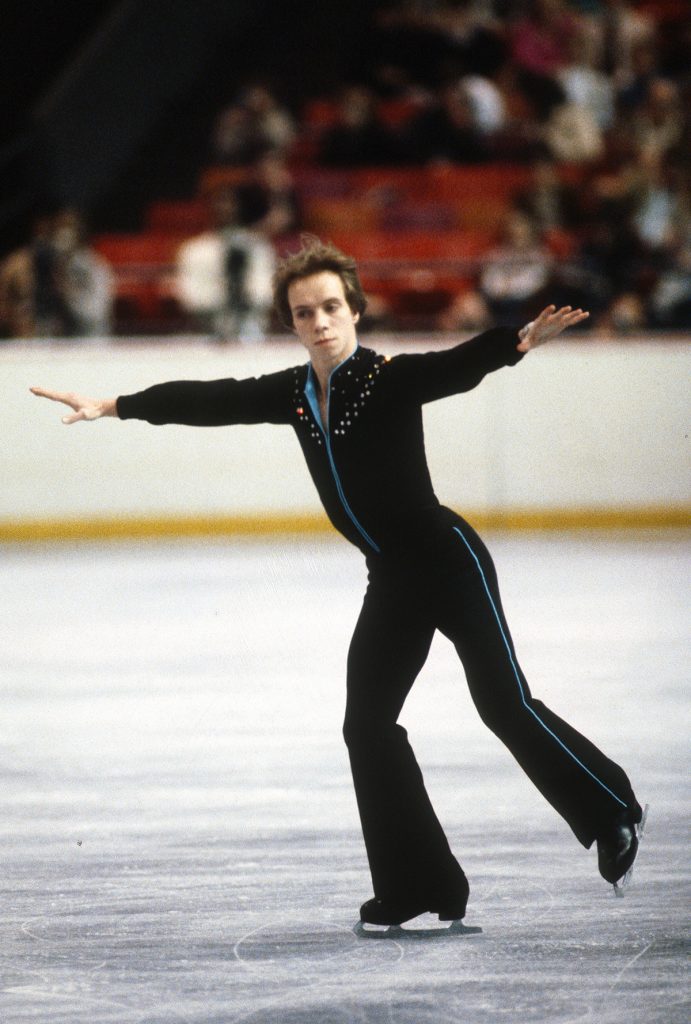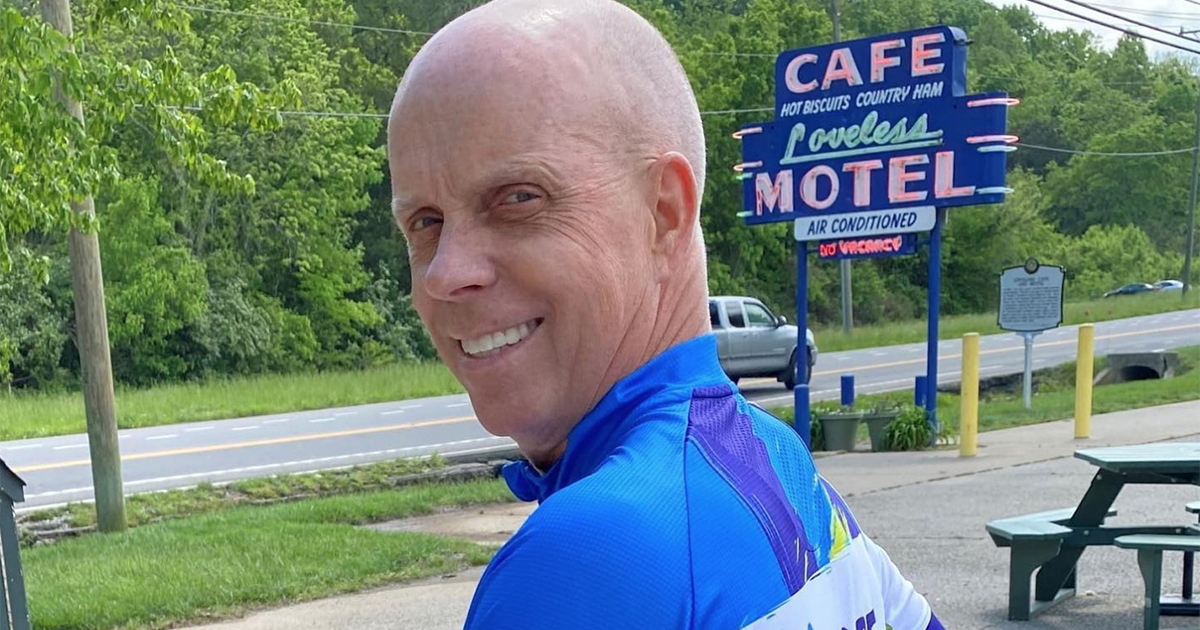Scott Hamilton's Cancer & Brain Tumor Journey
- Retired figure skater, Olympic gold medalist and testicular cancer survivor Scott Hamilton, 63, has once again completed the incredible feat of biking 444 miles for cancer research!
- In addition to being a testicular cancer survivor, Hamilton is currently living with his third benign (noncancerous) brain tumor.
- The 1984 men’s Olympic figure skating champion was diagnosed with testicular cancer in March 1997. Thankfully, by September of that year, he was in remission, but not without first going through treatment.
Hamilton, who's originally from Toledo, Ohio, but now lives in Nashville, Tenn., finished the second annual Erase the Trace bike ride on Saturday, 25 years after completing his third round of chemotherapy for testicular cancer. The money raised from the Erase the Trace bike ride will go toward glioblastoma research. (Erase the Trace is an event set up by the Scott Hamilton CARES Foundation, which was created to help fund cancer treatment research.)
Read MoreView this post on Instagram
"Today (Saturday), I'm feeling blessed to feel the sunshine on my face as I continue riding the Natchez Trace to raise funds for Glioblastoma cancer research," he added. (The Natchez Trace is a historic forest trail that extends about 440 miles from Nashville to Natchez, Miss.)
"There is hope. Hang in there."
Hamilton began his more than 400-mile bike ride last Tuesday in Natchez, Miss., and finished on Saturday.
On Sunday (Mother's Day), one day after finishing the incredible bike ride for the second time, Hamilton took to social media to honor his late mother, who passed away from breast cancer 45 years ago.
"I miss her more and more each day," he posted to Instagram and Twitter. "Today, I choose to celebrate, honor and remember her and the cherished time I was able to spend with her on earth. She was truly the best mother I could have asked for."
It's been 45 years since I lost my beautiful mother Dorothy to breast cancer. I miss her more and more each day. Today, I choose to celebrate, honor and remember her and the cherished time I was able to spend with her on earth. She was truly the best mother I could have asked for pic.twitter.com/oF7mTRIqjx
Scott Hamilton (@ScottHamilton84) May 8, 2022
In addition to being a testicular cancer survivor, Hamilton is currently living with his third (yes, third) benign (noncancerous) brain tumor. While his tumor is benign, his condition makes raising funds for glioblastoma (a type of aggressive brain cancer) all the more meaningful.
Toward the end of the Erase the Trace ride, Scott Hamilton was surprised by his sons, Maxx, 14, and Aidan, 18, who accompanied their father on the final miles of his ride in Nashville. Wife Tracie Hamilton was there to capture photos at the finish line, as well.

Scott Hamilton Cancer & Brain Tumor Journey
Scott Hamilton, the 1984 men’s Olympic figure skating champion, was diagnosed with testicular cancer in March 1997.
Thankfully, by September of that year, he was in remission, but not without first going through treatment. According to The New York Times, Hamilton went through chemotherapy to reduce the size of his tumor (which was located in his abdomen and about the size of a two grapefruit) before having surgery in late June 1997. During surgery, the tumor and his right testicle were removed.
"The fear was beyond anything I had ever experienced," Hamilton said of his cancer diagnosis during an interview with Coping magazine. "It was after I survived that I felt I could endure anything."

And Hamilton was right; he could endure anything, including three brain tumors.
In 2004, he was diagnosed with a benign brain tumor known as a craniopharyngioma, which are benign tumors that grow near the pituitary gland, according to Johns Hopkins Medicine. Craniopharyngiomas are most commonly found in children between the ages of 5 and 14, however, adults over age 50 can also develop these tumors.
He had a successful surgery on his tumor, but in 2010, he was diagnosed with yet another benign brain tumor, and again in 2016.
But all the while, the skating star continued living his best life. He met his wife, nutritionist Tracie Robinson, now 64, in 1999, and they married two years later. He also has four children with Tracie (now Hamilton) two of whom they adopted from Haiti.
As of October 2021, Hamilton said he's gone five years without any chemotherapy, though his brain tumor tends to oscillate between shrinking and growing. In a previous interview with SurvivorNet, Hamilton spoke about the attitude he's taken during his cancer and tumor journey.
"I choose to make the most of each day by enjoying the people and moments that I've been given and I encourage everyone to remember that we don't control the number of days we have on earth, we only control what we do with them," he said.
Understanding Testicular Cancer
Testicular cancer, the type of cancer Scott Hamilton was diagnosed with, starts in the testicles (also called testes; a single testicle is called a testis), and these organs are part of the male reproductive system. The two organs are each normally a little smaller than a golf ball in adult males, according to the American Cancer Society. The testes are held within a sac of skin called the scrotum, which hangs under the base of the penis.
Testicular cancer is not common, according to ACS. In fact, about 1 of every 250 males will develop testicular cancer at some point during their lifetime.
In contrast, since testicular cancer can usually be treated successfully, a man's lifetime risk of dying from this cancer is very low about 1 in 5,000.
Dr. Edwin Posadas, the medical director of the Urologic Oncology Program at Cedars-Sinai Cancer, previously told SurvivorNet that testicular cancer doesn't often present with pain, but it can.
Related: Save A Nut!: Testicular Cancer Survivor Mark Borja Makes it His Mission to Spread Awareness
"Most men will present with some sort of mass on their testicle; a sexual partner or spouse may feel the mass when they're being intimate," he said, adding that some men may notice blood in their ejaculate as a result of testicular cancer, which is a less common symptom.
Not All Brain Tumors Are Cancerous
Naturally, a lot of people think "cancer" when they hear the word tumor. However, most brain tumors aren't actually cancerous, like the tumors Scott Hamilton has been fighting since 2004. In fact, less than one third (about 32%) of brain tumors are considered malignant (cancerous), according to the American Brain Tumor Association.
If a tumor is made up of normal-looking cells, then the tumor is benign. But these tumors may still require treatment, such as surgery. Because of this, they are often referred to as "non-malignant," since the word benign can be misleading.
The most common type of non-malignant brain tumors are meningiomas, however, there are 120 different types of brain and central nervous system tumors, according to ABTA.
Oftentimes after an MRI, a biopsy will be performed on a brain tumor to determine its type. Sometimes, the results of imaging tests show that a tumor is likely to be non-malignant, and a biopsy is not necessary.
Contributing: Abigail Seaberg
Learn more about SurvivorNet's rigorous medical review process.


